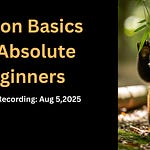In this video segment from my workshop on building AI prototypes, I walk through what I believe should be the first step in the process: prototype definition. Before building anything, I advocate defining three things:
What problem am I trying to solve?
What’s my hypothesis for how the prototype might solve it?
What evidence suggests it’s worth investigating?
I encourage approaching this like a scientist would approach a research question, rather than jumping straight into market-fit thinking. There’s nothing wrong with starting from a business mindset, but my approach puts the problem and the learning at the center. Especially for those of us working in education, it helps to begin with a problem you care about. That personal connection is what will sustain your motivation and focus. You don’t need to take on a grand challenge—start small. Hit singles, not home runs.
Let me give you an example of how I am applying this to an education problem.
I’ve struggled to learn new languages. I’ve tried different apps and tools, but nothing has really worked for me. So I decided to build a prototype that addresses that problem directly. My prototype is an AI-powered language tutor that uses roleplay to help learners practice conversational skills. The learner picks the language and enters a scenario—say, ordering at a restaurant. The AI plays the appropriate role (e.g. a waiter), and the learner responds in real-time. It’s interactive, immersive, and focused on practice, not passive review. It also provides, or should provide immediate feedback.
My hypothesis is that this type of approach—by combining immersive roleplay, immediate feedback, and formative assessment—can improve short-term retention and conversational fluency more effectively than flashcards or static lessons. To test this, I’ve looked into research on roleplay and formative assessment in learning. The results are promising and suggest this direction is worth pursuing.
So that’s my prototype definition: a problem I care about, a hypothesis for how to address it, and some evidence to guide the experiment.









